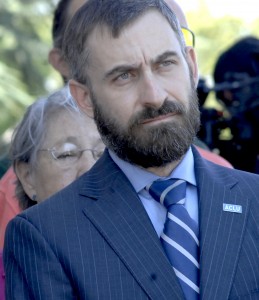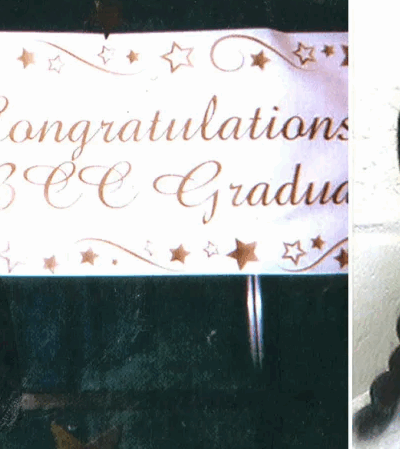News & Commentary

Ending Indefinite Solitary Confinement for the Vast Majority of People with Death Sentences in Oklahoma
By Travis Handler
Latest Event
Share this event "Stories That Free Us!" The Alabama Solution Screening & Panel Discussion
JJI hosts The Alabama Solution Screening + panel connecting prison conditions in Alabama & Oklahoma and why reform matters nationwide.
Join the Julius Jones Institute for a powerful community screening of The Alabama Solution, an Oscar-nominated 2025 documentary that brings audiences inside the Alabama Department of Corrections, revealing severe conditions, unchecked violence, and systemic failures long hidden from public view through footage recorded by incarcerated people themselves.
This event is hosted in partnership with C.A.N, Diversion Hub, Foundation for Liberating Minds, ACLU of Oklahoma, LiveFree Oklahoma, Oklahoma Appleseed and Vote For Change.
Though the film centers on Alabama’s prison crisis, these systemic issues are urgent not only in Alabama, but also in Oklahoma and across the United States, where communities are impacted by mass incarceration, lack of accountability, and human rights concerns within our carceral system.
Following the screening, stay for a community panel moderated by Senator Nikki Nice, where leaders and advocates will discuss how the film’s insights connect to justice system challenges nationally and locally, and explore pathways toward reform, accountability, healing, and collective action.

Legislature Should Stop Trying To Undermine Supreme Court Ruling, ACLU's Kiesel Says
OKLA
By

Legislature Should Move To Expand Medicaid, ACLU OK Executive Director Says
One way to do that, he said, was to expand Medicaid coverage. Kiesel pointed to a 2013 ACLU study that called on states to expand Medicaid coverage as a way to make communities safer. In the study, entitled Healthcare Not Handcuffs, the ACLU called for Medicaid expansion under the federal Affordable Care Act.
“By dramatically expanding and funding healthcare coverage to millions of currently uninsured people, the ACA represents a remarkable opportunity for criminal justice and drug policy reform advocates to advance efforts for policies promoting safe and healthy communities, without excessive reliance on the criminal justice solutions that have become so prevalent under the War on Drugs,” the study said.
According to the study, the expansion of the federal Medicaid programs represents an opportunity to “recast substance use disorders and drug use as a matter for public health rather than criminal justice.”
“This could be a huge tool to help fight crime and combat drug-related crimes,” Kiesel said.
He said a dramatic expansion of healthcare coverage would allow Oklahomans struggling with drug use to obtain community-based care and treatment, instead of incarceration.
Kiesel said state officials could harness the power of the ACA as low-cost and effective alternative to incarceration for defendants with substance use or mental health disorders.
A report, released by the Tulsa-based Oklahoma Policy I
By

ACLU OK 'Disappointed' By Council Action, Will Monitor Enforcement of Ordinance
ACLU Oklahoma Executive Director Ryan Kiesel said his organization would continue to oppose the ordinance and was in the process of evaluating their next steps.
“All options are on the table right now,” Kiesel said. “We will be monitoring closely how the ordinance is implemented and enforced. We have serious concerns that the city of Oklahoma City can enforce this ordinance and still comply with the 1st and 14th Amendments of the United States Constitution.”
By

Anti-panhandling Ordinance An Attack On The Poor, ACLU Leader Says
Last Friday, the City of Oklahoma City released a revised version of its proposed anti-panhandling ordinance. A provision of the ordinance would prevent panhandling on medians less than 30 feet wide. The ordinance would make an exception if the median was more than 200 feet away from an intersection. A vote on the proposal is set for Tuesday.
ACLU Oklahoma Legal Director Brady Henderson said the ordinance is unnecessary. Existing laws, he said, already regulate panhandling that poses a public safety risk. He said the new ordinance was an attempt by city officials to hide poverty from the public.
“All the city is trying to do is sweep poverty under the rug,” Henderson said. “Instead of helping individuals, like the vendors of the Curbside Chronicle, do everything they can to escape poverty, the city is trying to simply force them out of view.”
Kiesel said the ACLU O
By

The Heartbreaking Case of Tondalao Hall
McLOUD – About ten years ago, Tondalao Hall was sent to prison. Hall, who was 20 at the time, received a 30-year sentence for failing to protect her children from child abuse.Her boyfriend, Robert Braxton, was charged with four counts of child abuse. Law enforcement officials said Braxton broke the ribs and femur of the couple’s three-month-old daughter. Braxton was violent to both Hall and her children. Hall testified that Braxton choked her, punched her and grabbed her around the neck on several occasions.And though enforcement officials agreed Hall didn’t abuse her children, they said Hall had failed to protect the children because she allowed Braxton to watch them and that she didn’t report the abuse in a timely manner.During the trial, Braxton changed his plea and negotiated a deal that reduced his sentence to just ten years – two years in prison and eight years of probation, with credit for time served. Braxton was freed the day he pled.Things didn’t go so well for Hall.Before Braxton was released from custody, Hall had entered a blind plea. She was sentenced to a total of 30 years in prison by Oklahoma County District Judge Ray Elliott. Prior to her arrest, Hall had no criminal record. Today, Braxton is free. Today, Tondalao Hall remains in prison.A victim punishedFor several years, Hall has sought a modification of her sentence. She asked Elliott, the Oklahoma County District judge who sentenced her, for post conviction relief. She appealed her case to the Oklahoma Court of Criminal Appeals. She also asked the Oklahoma Pardon and Parole Board for clemency.Each time she’s been refused.Writing for the four-person majority, Oklahoma Court of Criminal Appeals Judge Arlene Johnson said Hall’s sentence didn’t shock the conscience of the court “based on the facts and circumstances of the case.”“A sentence within the statutory range will be affirmed on appeals unless, considering all the facts and circumstances, it shocks the conscience of the court,” Johnson wrote. “Hall pled guilty knowing that she would be sentenced by the court within the range provided by law and would have to serve 85 percent of any sentence imposed.”The fact that Braxton received a lesser sentence, Johnson wrote, does not make Hall’s sentence excessive. Not everyone agreed. In a blistering dissent, Court of Criminal Appeals Judge Charles Chapel said he “found some merit” in all three of Hall’s claims of error.“I would modify the petitioner’s sentence as to run the sentences on all four counts concurrently,” Chapel wrote.Hall’s case, Chapel said, was another reason why the state ought to revise how it reviews excessive sentence claims.“Here we have a... young women with three children who was involved in an abusive relationship,” Chapel wrote. “She had no prior record of any kind. Her abusive partner, who is apparently the father of her two youngest children, abused and seriously injured his own children. For committing these crimes he was sentenced to ten years, with eight of the ten years suspended. On the other hand this young woman with no criminal record who was charged with permitting abuse was sentenced to four 15-year sentences with two of the sentenced to run concurrently with the other two.”Still, Hall remains hopeful that she will be freed.Her case has generated national attention. The website Buzzfeed featured Hall’s case in a story about failure to protect laws. In addition, the activist group, UltraViolet, has launched an effort to have Hall’s sentence reduced.“Tondalao Hall shouldn’t be in prison while the man who abused her and her children is free,” the group said in a statement published by Buzzfeed.Additionally, officials with the American Civil Liberties Union of Oklahoma said the organization is actively reviewing Hall’s case. Hall’s sentence, ACLU Oklahoma Legal Director Brady Henderson said, was the perfect example of justice gone wrong.“This is a case where the prosecutor let the bad guy go and sent a victim to prison. That’s wrong,” he said. “That’s not justice. The court failed to even consider the fact that Tondalao Hall was the victim of severe domestic abuse even after it was brought to its attention.”Henderson said the reason Hall’s sentence was so harsh was that prosecutors blamed Hall for their weak case.“The prosecutor didn’t do her job,” Henderson said. “So she blamed a women who had been abused and choked by the man sitting across from her.”Punishment for a bad caseHall was prosecuted by Oklahoma County Assistant District Attorney Angela Marsee. Marsee left her Oklahoma County office and currently serves as District Attorney for Custer, Ellis, Roger Mills and Washita Counties.During Hall’s trial Marsee said Hall was the reason the state’s case “fell apart.”“As this court is well aware, the case against the co-defendant fell apart in part because of her minimizing and denying what happened in the household,” Marsee said. “So she shouldn’t get the benefit of that.”Still, even Marsee said Braxton should have received a harsher punishment than Hall.“He definitely should have received a more significant sentence,” she said during Hall’s sentencing hearing. “But because of her minimizing and continuing to protect herself and protect him that had a real impact on what we were able to do with him during the jury trial. So she should not benefit from that.”Court records show that Hall testified Braxton had “put his hands on her throat and choked her.” In addition Elliott, the judge, acknowledged that Hall was fearful of Braxton. But Hall, Elliott claimed, was hiding something.“There would be certain questions that would be asked of her where she would look over at the defendant and make direct eye contact prior to her taking a moment or two to respond,” Elliot said. “This tells me something, based on my years of experience. Was she scared of him? Probably.”Hall, Elliott said, was less than candid.“I think, in my opinion, that she lied on some issues under oath,” Elliot said. “That’s just my opinion, which I have the right to have, in light of I’m her sentencing judge.”Henderson said if the judge or the prosecutor believed Hall was being untruthful, they should have charged her with contempt of court or perjury. Records show that neither Elliot nor Marsee took action against Hall.“If they thought she was lying, why didn’t they prosecute her?” Henderson said. “They didn’t because they didn’t have a case. Hall’s reluctance to testify against the man that beat her was understandable. You take a young battered woman, with little world experience and you make her testify against the man who was abusing her and she’s obviously going to be frightened. She was fearful about her life and the safety of her children, and the DA’s office did nothing to protect her or properly prepare her to testify.”ACLU Oklahoma Executive Director Ryan Kiesel said the organization would continue to examine Hall's case.“It’s a heartbreaking case,” he said. “When a law can cause more harm than good, we should consider every effort to change the law and undue any injustice it has caused in the meantime.”For her part, Hall said she remains focused on trying to modify her sentence. “I’d like to go home,” she said. “I’d like to see my babies.”
By

Stay Informed
Sign up to be the first to hear about how to take action.
By completing this form, I agree to receive occasional emails per the terms of the ACLU’s privacy statement.
By completing this form, I agree to receive occasional emails per the terms of the ACLU’s privacy statement.


